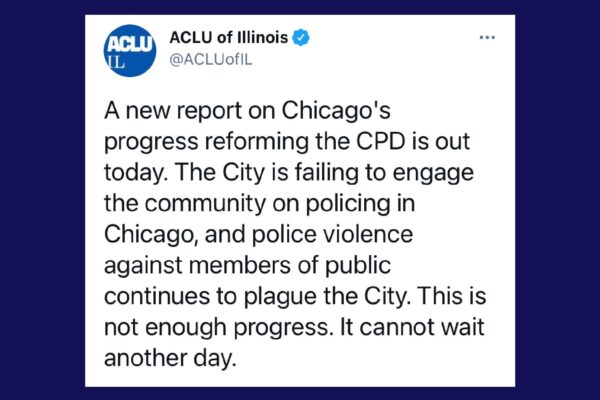The below statement can be attributed to Nusrat Choudhury, legal director at the ACLU of Illinois:
“The Monitor’s report issued last night begs a simple question: What change in policing are Chicago residents actually seeing in their neighborhoods? This question urgently needs a positive answer more than two years after the entry of a federal court consent decree governing Chicago police to remedy patterns of excessive force against people of color and people with disabilities.
But Black and Brown neighborhoods are seeing little, if any, change.
The City has made insufficient progress in changing policing on the ground. Today’s report catalogues once again that the City and Chicago Police Department missed most deadlines—measures required under the consent decree to fix broken policing in a City with a painful history of police violence. Most strikingly, the monitor’s report shows a continued absence of real community engagement – the lynchpin of ensuring that changes to policing address communities’ needs and painstakingly rebuild the trust between police and neighborhoods that has been destroyed.
The Monitor finds that the City and CPD lack consistent procedures for engaging community members and, that when they do reach out, they prevent “meaningful participation” by seeking public comment late in the process when policies are close to being finalized. This is not community engagement. The City and CPD must actually want to meet early with community members and organizations from the neighborhoods most impacted by police violence, be open to their recommendations, and collaborate on solutions. This approach has been woefully absent from the City’s response to community concerns about wrong home raids that hurt Black and Brown communities, where the City has not met with the coalition of community organizations enforcing the Chicago Police consent decree, which raised this issue months ago.
The Monitor recognizes that many of those who protested in the streets of Chicago last summer following the horrific killing of George Floyd are calling for police accountability and other changes that directly relate to around twenty separate provisions of the Chicago policing consent decree. Yet, Chicago police met many protesters with baton strikes to the head, pepper spray, retaliation for recording police violence, and efforts to evade accountability by covering their name badges and star numbers.
In the face of this real time police violence in the midst of calls for racial justice, missing fewer deadlines and providing documents to the Monitor is not enough. We call on the City to reflect in its conduct that the consent decree is an opportunity for working with community partners in the hard work of transformational change to advance fairness and safety for all communities.
It has been four years since the U.S. Department of Justice report laid bare the problems causing the Chicago Police Department’s pattern of unconstitutional police violence against people of color. The need for action cannot wait another day.”

